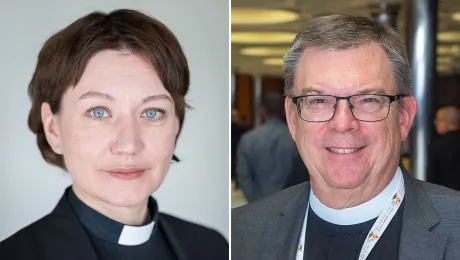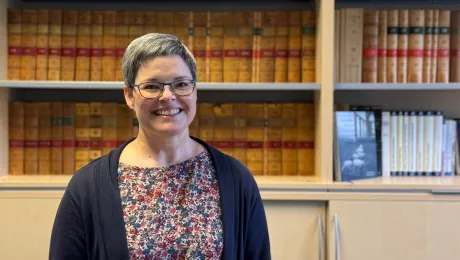
Rahmawati Husein, assistant professor of government studies at Muhammadiyah University of Yogyakarta, speaks at the Christian-Muslim interfaith conference. © LWF/Anto Akkara
Best Grassroots Practices Presented at LWF Interfaith Conference
Grass root level banking systems for the poor have been hailed as examples of the kind of economic democracy promoted by The Lutheran World Federation (LWF) to counter greed and exploitation.
Speakers at the 12-17 March interfaith dialogue on democratic polity and the common good at Medan, in the North Sumatra province of Indonesia, endorsed the popular credit union system in Indonesia as a model of economic democracy that helps empower the poor against market forces.
“Credit unions are not about money alone. Besides arranging loans for the people, they have overriding influence on the life of the people,” Rev. Nelson Siregar, head of the diakonia department of the Protestant Christian Batak Church (HKBP), told the interfaith conference.
The gathering was organized by the LWF Department for Theology and Public Witness, the LWF National Committee in Indonesia and the Muhammadiyah University of Yogyakarta.
Forty Christian and Muslim leaders, activists and economists from India, Indonesia, Malaysia, Namibia, the United States and the Netherlands met to develop common strategies on how society can work for the common good.
Credit unions have become an integral part of the life of the agrarian villages of India and of the urban poor in Indonesia, Siregar said. “Credit unions have brought economic freedom to thousands of families.”
Apart from providing loans to ordinary people who are considered untrustworthy by banks, Siregar noted that credit unions have prompted “massive social changes,” permitting members to shape their economic activities and destinies.
“This is not only an alternative banking system, but a clear example of democracy at the grass roots level. It has been a powerful tool for social liberation. Even bed-ridden HIV and AIDS sufferers are now conducting their own businesses with the support of credit unions,” said the HKBP leader.
Indonesia’s largest Lutheran church with 4.1 million members, the HKBP has 600 credit union branches with over 20,000 members.
Benefits for the Poor
Rahmawati Husein, assistant professor of government studies at the Muhammadiyah University maintained that micro-credit benefits women. “While banks deny loans to the poor for lack of security, it’s still worse for women. Women need a husband’s signatures to avail themselves of loans,” said Husein.
“But in the credit unions, the women stand on their feet. There are no external factors or superiors to dictate orders, and the members take the decisions,” she remarked.
Adi Setia, assistant professor at the International Islamic University in Kuala Lumpur, Malaysia, described micro-credit as a powerful weapon for social change and economic uplifting in situations of extreme poverty. It “is a movement against the capitalist banking system,” he emphasized.
Rev. Claudia Haarmann of the Evangelical Lutheran Church in the Republic of Namibia told the conference how the Basic Income Grant (BIG) poverty reduction campaign is playing a similar role in the mineral rich Southern African nation where unemployment rate is estimated at 50 percent. The ELCRN has taken a leading role in the initiative that is supported by a coalition of civil society organizations.
Under a two-year BIG pilot project started in 2008, Namibian dollars 100 (USD 10) was paid out monthly per head to residents of Otjivero to encourage small scale enterprises in this settlement community marked by poverty, some 100 kilometers from the capital Windhoek.
Haarmann summarized the project’s success: “As a result of steady support, malnutrition has declined from 42 percent to 10 percent. School attendance has improved and children are going to school with cleaner and better uniforms.”
She noted however, “Right now this is a voluntary program led by the church and social action groups. The state has a duty to assure that the people have the means for a decent living.”
“It is not enough that the government collects royalties for oil and mining on behalf of the people. It has to make concrete plans to ensure that the royalties are transferred to the people. This is also necessary for a true democracy,” Haarmann urged.
(670 words)


